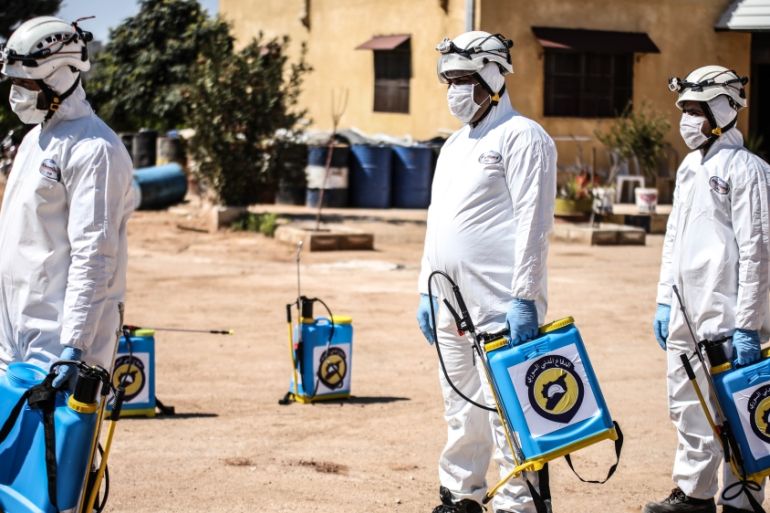War-torn Syria braces for lockdown after first virus case
World Health Organization says testing for the novel coronavirus is to start within days in northwest Syria.

Syrians rushed to stock up on food and fuel Monday amid fears that authorities would resort to even stricter measures after reporting the first coronavirus infection in the country, where the healthcare system has been decimated by nearly a decade of civil war.
According to the World Health Organization, testing for the novel coronavirus is to start within days in northwest Syria, amid fears of a disaster if the pandemic reaches overcrowded displacement camps.
Keep reading
list of 3 itemsJordan authorises use of hydroxychloroquine to treat COVID-19
‘We’ll die like cattle’: Kashmiris fear coronavirus outbreak
“Testing will be available in Idlib in two days,” WHO spokesman Hedinn Halldorsson said on Monday.
Some 300 COVID-19 diagnostic kits are to be delivered to a laboratory in Idlib city on Wednesday and “testing should start shortly afterwards”, he said.
An additional 2,000 tests would be delivered as soon as possible, he added.
So far three suspected cases in northwest Syria have tested negative after hospitals sent samples to Turkey, Halldorsson said, but fears remain high.
|
|
“WHO is extremely concerned about the impact COVID-19 may have in the northwest,” Halldorsson said.
“Displaced people [there] live under conditions that make them vulnerable to respiratory infections,” he told the AFP news agency.
Those included overcrowded living conditions, physical and mental stress, as well as a lack of housing, food and clean water.
As part of a wider response plan for the region, three hospitals with intensive care units have been modified as isolation units equipped with ventilators, the WHO spokesman said.
Up to 1,000 healthcare workers have been mobilised, and a new delivery of protective gear, including 10,000 surgical masks and 500 respirator masks, should arrive within the week.
Bracing for wider closures
Concern about all the displaced was increased after the Damascus government on Sunday announced the country’s first official case of the novel coronavirus.
Lines formed outside grocery stores, banks and petrol stations across the Syrian capital, Damascus, as people braced for wider closures. The government has already closed restaurants, cafes and other businesses, and has halted public transportation.
The city’s famed Hamidiyeh souk, a network of covered markets running through the Old City, was deserted after the government ordered all shops closed on Sunday.
Authorities closed border crossings with Lebanon and Jordan, and Damascus International Airport was closed to commercial traffic after a final flight arrived from Moscow. State-run newspapers issued their last print edition and will only be available online.
Syria has close ties to Iran, which is a key ally of the government in the civil war, and Shia pilgrims frequently travel between the two countries. Syria’s health ministry reported the first case of coronavirus late Sunday – a 20-year-old woman it said had arrived from another country, without elaborating.
Ravaged by war
An open-ended curfew went into effect Monday in parts of northern and eastern Syria, which are controlled by a Kurdish-led civilian administration. It was not immediately clear how that would affect hundreds of US troops stationed in the region.
Syria’s healthcare system has been ravaged by nearly a decade of war that has displaced millions of people and spawned rampant poverty. Hospitals and clinics across the country have been destroyed or damaged. The government is also under heavy international sanctions linked to its conduct during the war.
Most people only experience mild symptoms from the COVID-19 disease caused by the virus and recover within weeks. But it is highly contagious and causes severe illness in some patients, particularly the elderly and those with weakened immune systems. People can carry and spread the virus without showing any symptoms.
Hundreds of thousands of people have been infected worldwide, and more than 15,000 have died. About 100,000 people have recovered.